05
It’s official! This Chennai boy is the best speaker in the world
These self-professed nerds would take on topics of international relations and economics over sports and pop culture any day.
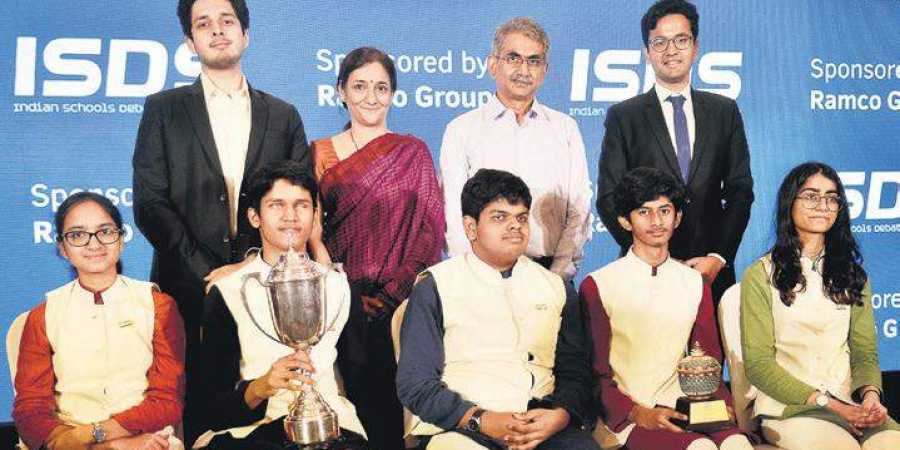
It was India all the way at the World Schools Debating Championships (WSDC) 2019 in Bangkok. The five-man team fielded by the country won the championship and one of the team-members, Chennai’s Tejas Subramaniam, went on to be crowned the ‘best speaker in the world’.
A proud mother Vinutha Subramaniam said she was among those who had given up debating with him as he already was the best speaker in the family.
“After one point he knew too many things. So, we couldn’t debate with him. He started speaking quite early and by the time he was 1, he could speak complete sentences. At around 2, he would speak a sentence in Tamil and be able to repeat it in English so much so that we would call him ‘Major Sundarrajan’ (after a famous Tamil actor),” Vinutha said.
The team, which also included Bhavya Shah, Manya Gupta, Saranya Ravindran and Prithvi Arun, had already prepared 140 motions before the championships with the help of their coaches Dhruva Bhat, Sayeqa Islam and Dhananjay Ashok among others.
“There was not a single topic that we were baffled by,” said Saranya, a student of Padma Seshadri Bala Bhavan Senior Secondary School in Chennai.
The team might have made giant strides this year, but proving their mettle on the global debating circuit was an experience in itself.
“Because we are accented, sometimes I think we are not understood. Like, for example, when the judges give us our feedback, they tell us you made a new argument in your third speech when we clearly made it in our earlier speeches too,” Tejas, who like Saranya studies in Padma Seshadri Bala Bhavan Senior Secondary School, said.
First visually impaired speaker to debate in the final
Bhavya, a student of Rao Junior College of Science in Mumbai, the team’s ‘Funny guy’, became the first visually impaired speaker to debate in a WSDC final and to make it among the top 10 speakers.
He was named the sixth best speaker in the world.
Bhavya shared some of his most memorable moments.
When debating against Canada opposing the motion “This House would ban the practice of ‘importing brides’, Canada’s argument was that if importing brides were to be legalised, other refugees would be affected because of the opportunity cost,” Bhavya said.
“So, I argued that this was an argument against any other form of immigration. What if team Canada so decides, ‘we don’t want Indians coming into the country because they’re better at debating than we are?’,” he said.
Point made, the team went on to win defeat the Canadians 3-0.
It was Canada whom they defeated in the final also, proposing the motion “This house regrets the glorification of soldiers as heroes”.
source: http://www.newindianexpress.com / The New Indian Express / Home> Good News / by Express News Service / August 03rd, 2019
e-slippers, gliding platforms and more: meet the student innovators of Maddur
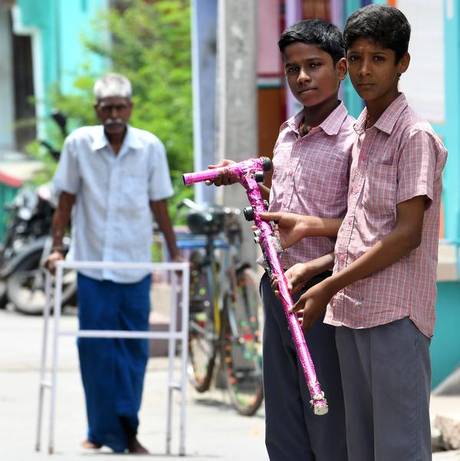
The students of Buchireddy Palli Government School have been winning accolades for their clever innovations aimed at saving lives
It is morning in Maddur, a little village nestled in the valley of the lush Tiruttani hills in Tamil Nadu. I make my way past the railway crossing that looks straight out of an R.K. Narayan story and climb into a rickshaw. It takes me past houses with decorative pillars and thinnais(porches) of old-fashioned houses. As the auto sputters down, I hear the rattle of power looms — the main occupation in Maddur is weaving.
Maddur, of late, has earned a new distinction. The students of Buchireddy Palli Government School have been winning accolades for their clever innovations aimed at saving lives and improving the lives of people with disability. Maddur has few streetlights, and many pedestrians fall prey to road accidents. So Class X students S. Parthiban and V.M. Akashwaran came up with ‘e-slippers’.
The footwear operates on the principle of piezo-electricity and has LED strips that light up when the user walks. Rechargeable lithium-ion batteries, which charge devices like mobile phones, are connected to the slippers.
The duo has also come up with a multi-purpose walking stick with sensors that can detect hazards such as fires or floods.
The Buchireddy Palli Government School is an austere, three-storied building that houses both English and Tamil medium departments from classes VI to XII. When I get there just before lunch break, I spot some bright-eyed children sneaking out of their classrooms. Science teacher R. Dharmalingam, has nothing but appreciation for his students. “They are self-driven, curious and never afraid to ask questions,” he says.
“Most of their projects are self-funded, but the headmaster has also helped. I have sat with them after school hours to encourage them.” The school’s involvement is obvious. Dharmalingam accompanied Akashwaran and Parthiban when they showcased their work at the Southern India Science and Technology Fair in Bengaluru.
Out of the box
At Akashwaran’s house, we are greeted with effusive hospitality. Akashwaran and his friend Gunasekaran, still in their uniforms, are poring over a cardboard model. I ask them what they are working on. “This is a gliding platform meant for people with disability or the elderly so that they can cross railway platforms without having to use the overbridge,” Akashwaran tells me. The two then demonstrate the working model.
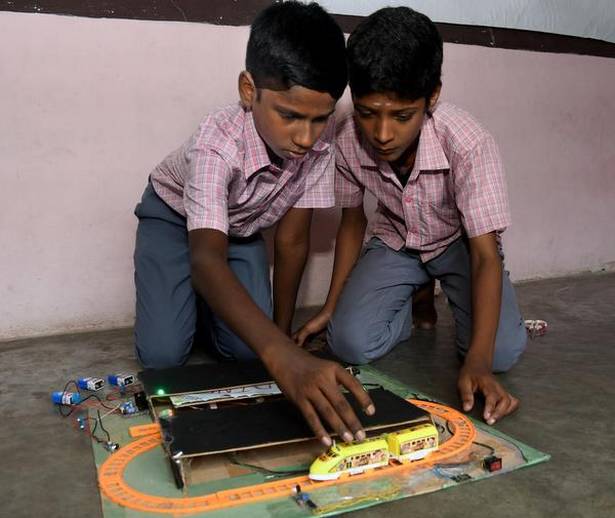
Akash thought of this when I complained about the climb at the station. Since then he’s been trying to figure out a workable solution,” beams his mother Vatsala.
“It used to be based on hydraulic motion but I changed it to a motor-based system. The platform will move forward when the switch is pressed. IR sensors will detect approaching trains and the platform will then retreat,” Gunasekaran explains. They have even thought about warning systems — a buzzer sound to alert the blind and a flashing red light for the deaf.
M.N. Haripratap is in Class IX in the same school. He has designed a bridge model where the structure opens up during high tide to allow ships to pass and then folds back again. It won him a district-level prize from the Chief Education Officer of Thiruvallur district.
The students’ love for science and innovation is apparent. “Akash took part in a science exhibition at Sri Krishna Polytechnic and was fascinated by what he saw,” says Vatsala. Interested in electronics, programming and robotics, he recently received a special prize for excellence in science from Anna University, Chennai, during its tech fest, ‘Kurukshetra’. He was also awarded a token of appreciation by former ISRO director Mylswamy Annadurai.
“I want to be a scientist,” says Akash. “Abdul Kalam has always been a role model for me.” I ask him what’s next on the agenda. His small, serious face lights up as he talks of solar-powered cycles, ambulance-sensitive speed-breakers, and earthquake-sensing fences.
Whatever the students of this special school do next, I know they will put Maddur on the map with their thoughtful, people-focused innovations.
The writer is a civil engineer and dog lover with a nose for music and art.
source: http://www.thehindu.com / The Hindu / Home> Sci-Tech> Environment – Young Minds / by Gayatri Ramdas / August 03rd, 2019
Looking beyond the label
Bonding over sustainable fashion & conscious living, three feisty women set up Wildflower — a brand that resonates with their cause.
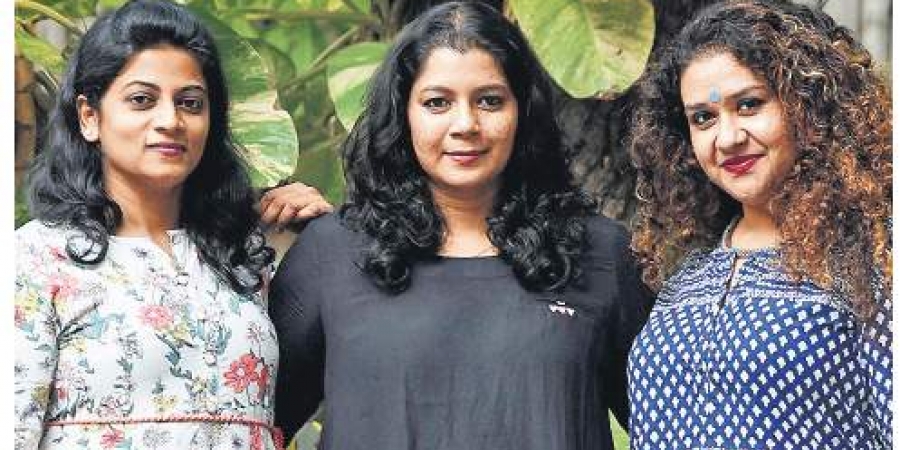
Chennai :
Friends Sangeetha Arul, Anjula Giriam and Shibi Kumaramangalam had a vision — to organise pop-up events that were different from the rest. So, the trio established Wildflower in 2018, a platform that promotes sustainable and ecofriendly brands from all over India. “We believe that conscious shopping decisions can make a positive impact on the environment, society and lifestyle,” share the trio. In a freewheeling chat with CE, they discuss their journey, life lessons, philosophies and more. Excerpts follow.
Tell us about your journey in event management?
Sangeetha: I was in the communication field and coordinating has been one of my strong skills. When I was in the US from 1999 to 2012, I used to help around with Tamil Sangam, a group where all the US-based Tamil people would gather and conduct events. I realised that management was one of my strengths and decided to put it to good use. Anjula and I went to college together, but were doing different things. We met after a long break in 2012 and decided to start our own company.
Shibi: I’m a lawyer and I predominantly work in the field of women’s rights, sexual harassment at the workplace. But I’ve always been interested in sustainable fashion and conscious living. When I heard about Sangeetha and Anjula’s business idea, I was impressed with the way they had put everything together — promoting conscious consumption. I decided to collaborate with them for the pop-up, which aimed to promote awareness about ethical fashion.
How do you choose the brands you work with?
Shibi: When it comes to choosing brands, we ensure we invite brands which promote sustainable living and fashion. For instance, Last Forest is a brand that we support. They come from Kotagiri and work with the Toda tribe. Apart from ensuring that a brand is ethical, we also focus on the procurement process, that is sourcing and packaging is done in an eco-friendly way.
We follow a strict no-plastic policy. We try to promote the concept of ‘less waste’ by creating awareness on reuse, repurpose and recycle. We want to show people that being environmentally friendly and conscious is not unaffordable. Working with local brands not only supports local entrepreneurs, but it also enables the customers to develop a good rapport and relationship with them.
What is the first step towards a sustainable lifestyle?
Sangeetha: We send out around 80,000 bags of garbage every day, just think about the volume of consumption and wastage. I believe that rather than just a handful of people working towards a sustainable and eco-friendly lifestyle, thousands of people doing it imperfectly is fine and that makes a huge difference. We need to encourage people to take small steps…it will go a long way. Shibi: I’m very passionate about sustainable fashion and conscious living. This is my first venture with Wildflower, we organise events that promote conscious consumption. It is not about making profit, but we want to introduce shoppers to a sustainable principle.
What is your most memorable event of all the events you have organised so far?
Sangeetha: The first event which was held in March 24, 2018 at Hiranandani called Spring Fling Fashion was quite memorable. We had to start from scratch — right from finding vendors, talking, convincing and sourcing from them, everything had to be done. It was trial and error. Another challenge was to get in touch with these sustainable brands from all over India
. People were apprehensive. We learned a lot from the event. Though it was challenging, it was a learning curve and served as a stepping stone for us to do bigger and better. Our dream is to extend our help to all the start-ups and budding women entrepreneurs. We want to help them with marketing and communication services. Anjula: We had just started and everything was new to us, but it was nice to see people turn up from different parts of the country to Chennai. We received excellent response for our first event.
Tell us about a typical day.
Sangeetha: My day starts at 6 am. As soon as I send my children to school, I start preparing for my meetings, as per the day’s schedule. I usually have phone calls lined up with vendors and clients. By the end of the day, I am exhausted.
Event management is challenging, but I love my job! Shibi: I send my six-year-old daughter to school, go on with my day job, meet friends in the evening and hang out with them. I feel women are inherently very good multi-taskers. Sometimes I also help to rehabilitate abandoned pets. Anjula: I’m a part-time home baker. First thing is to manage the house and my child. I read when I’m not baking or busy meeting people for the events.
What are your life philosophies?
Shibi: Surround yourself with positive people and positive energy. Do one good thing and try to give back. Life is short, eat the cake, drink wine, buy the shoes. Sangeetha: I try to live a balanced life, hoping to make a small positive impact on the environment and society. Anjula: Whatever life throws at you, take it slow.
What do you love about Chennai?
Sangeetha: A big chunk of my life was in the US. But currently, Chennai has become a place where I can do what I love while being surrounded by friends and families. Shibi: I’ve lived away from the city most of the time and there is no place like home. With my regular meet-ups with my friends at Chamiers and exploring new places — Chennai offers a beautiful experience.
Anjula: I grew up in a conservative environment and after moving to Chennai from Sivakasi after my marraige, I was able to be myself without people judging me. I meet friends and feel quite lucky. Not everybody gets to do that.
How do you recharge your energy at the end of the day?
Sangeetha: When everybody goes to bed, I ensure I spend time with myself. The peace helps me get through the next day. Shibi: Socialising and Netflix Anjula: I read books.
What are the life lessons you have learned through your work experience?
Sangeetha: We couldn’t say no to people before and now we know where to draw a line. I learned to be tough and sure of what we want from others and their expectations. You can’t please everyone. Anjula: I learned new skills from the most unlikely places and people. I am not a social person, but I realised I could be if I wanted to. From printing to creating promos, we learned the nuances of the business.
What plans do you have for Wildflower?
Sangeetha: Currently, we are keeping it small and taking forward all the lessons we have learned more sustainably. It’s about quality and not quantity for us. We want to make a difference. Shibi: We don’t want people to just buy, but also know about the products and become ethical in consumption. We want to provide our customers with affordable cotton dresses which are not mass-produced…skincare brands which recycle ‘dabbas’, cloth pads.
source: http://www.newindianexpress.com / The New Indian Express / Home> Cities> Chennai / by Rinreichui Kashung / Express News Service / August 01st, 2019
01st
Google Doodle celebrates Dr. Muthulakshmi Reddi, India’s first woman legislator
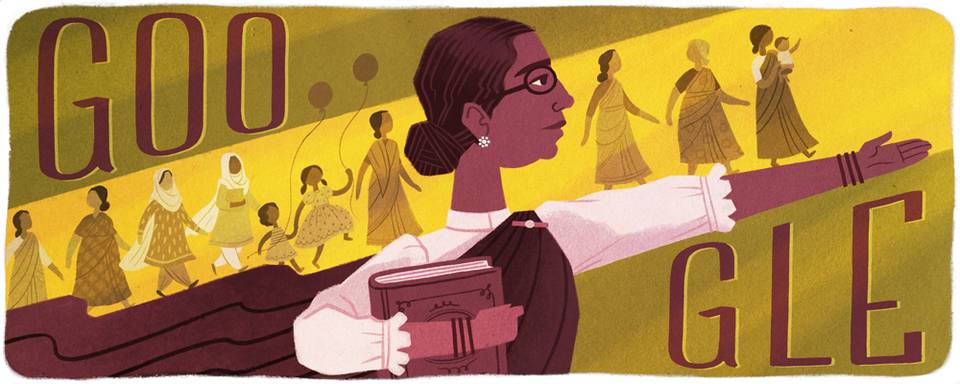
She was also one of the first women doctors in India and the first woman house surgeon in the Government Maternity Hospital, Madras
Today’s Google Doodle celebrated Dr. Muthulakshmi Reddi, a surgeon, educator, lawmaker and social reformer, on her 133rd birth anniversary. Dr. Reddi devoted her life to public health and fought the battle against gender inequality. The Government of Tamil Nadu announced on Monday that government hospitals in the State will celebrate her birth anniversary as ‘ Hospital Day ‘ every year .
Born in 1886 in Pudukkottai, Tamil Nadu, Dr. Reddi was the first Indian girl student in the Department of Surgery at Madras Medical College. This was just one of her many firsts. She became one of the first women doctors in India in 1912, and the first woman house surgeon in the Government Maternity Hospital, Madras.
She co-founded the Women’s Indian Association in 1918, and as the first woman member (and vice president) of the Madras Legislative Council — making her the first woman legislator in India — she helped raise the minimum age for marriage for girls and pushed the Council to pass the Immoral Traffic Control Act, and the Devadasi system abolishment Bill.
She resigned from the Council to support the Salt Satyagraha. When three young devadasi girls knocked on her door in 1930, she established the Avvai Home to shelter and educate girls like them.
In 1954, she opened the Cancer Institute in Chennai and in 1956 was awarded the Padma Bhushan. She passed away in 1968 at the age of 81.
Here is Dr. Reddi herself on the role of women in an article published in the August 15, 1947 Independence Day edition of The Hindu:
“Indian women have a great role to play in the modern world, with its chaos and rumblings of another war. With their background of philosophy and religion, with their apprenticeship under Gandhian leadership, with the sense of motherhood strong in them they can be and should be the ambassadors of love, peace and unity. It is the Gandhian concept of non-violence alone that can save the world from a cataclysm. And it is the women of India alone who can carry the message best so that the world may come together in unity and peace.”
The Doodle showing Dr. Reddi guiding young girls and women was created by Bangalore-based guest artist Archana Sreenivasan. The Doodle page also displays other early concepts drawn by the artist for this occasion.
source: http://www.thehindu.com / The Hindu / Home> News / The Hindu Net Desk / July 30th, 2019
Sathyamangalam tiger reserve receives best performer award in India
Various measures by forest officials helped this tiger reserve to consistently recorded more than 30 percent annual increment in tiger population, which is highest for a tiger landscape in India.
Chennai :
Sathyamangalam Tiger Reserve (STR), which is created in 2013, is adjudged as the best performer in the country for its ability to increase more tigers between 2014-18 compared to any other tiger reserve in the country.
The award, instituted by National Tiger Conservation Authority (NTCA), was received by STR Field Director V Naganathan from Prime Minister Narendra Modi on Monday during the release of 4th cycle of All India Tiger Estimation results, which coincides with the Global Tiger Day.
source: http://www.newindianexpress.com / The New Indian Express / Home> States> Tamil Nadu / by S. V. Krishna Chaityana / Express News Service / July 29th, 2019
34
Grit, gold and glory: Tamil Nadu village girl makes India proud
With absolutely no support from the government, Anuradha has been able to bag an international medal. Even after her recent victory, there has been no communication from the state government.
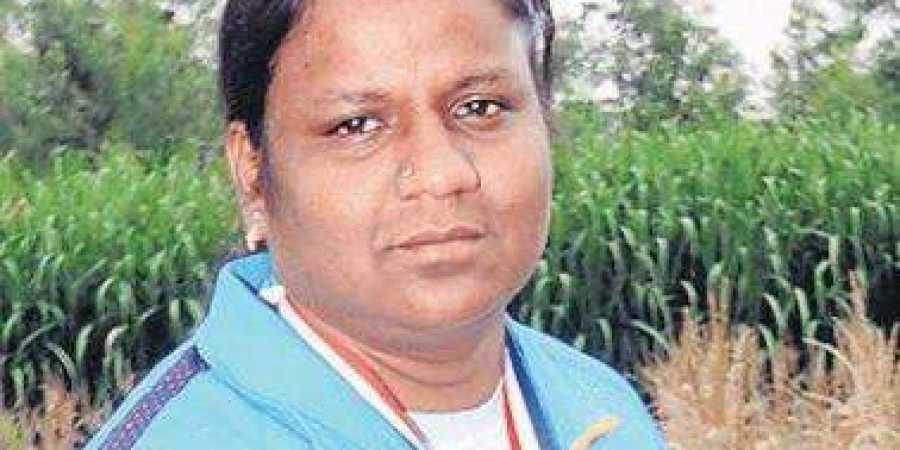
Chennai :
It’s common to look for signboards on unknown roads. But, en route to Nemmelipatti in Pudukottai, huge flex boards with congratulatory messages for 26-year-old P Anuradha, a resident of the village who won a gold medal in the Commonwealth Weightlifting Championship held at Samoa from July 9 to 14, guide us. The 4-km stretch from Perungalur leading us to the lush green village is dotted with posters of Anuradha, the pride of Nemmelipatti.
We reach the village, which has a population of about 1,000 people. Just the day before we visited, Anuradha was given a hero’s welcome at Tiruchy airport and her village. For young girls in the village, Anuradha is a beacon of hope, of what can be achieved with pure grit, determination and hard work. The people of Nemmelipatti, Anuradha tells us, have always been supportive of her dreams. They have been a great source of support for her family.
We make our way to Anuradha’s house, find a quiet spot and chat with the champion who is soaking in the success of her win and her brother P Marimuthu, about the journey so far. Flanked by agricultural land, Anuradha’s house is a simple abode which her brother has built. From living in a thatched hut to having a house they call their own, Marimuthu is an example of what can be achieved by hard work. We sit in the verandah of their house, their rooster and goats also making us aware of their presence.
With absolutely no support from the government, Anuradha has been able to achieve an international medal. Even after her recent victory, there has been no communication from the state government. No word of congratulation from the CM or anybody from the state government. She was only felicitated by the collector of Pudukottai.
Sibling support
Like most teenagers, Anuradha was unsure about her career goals. She considered a career in engineering, but her brother had other plans for her. “I thought it would be better for her if she pursued sports. I didn’t want her to be one among the 1,000 engineering graduates without a job. So when she completed class 12, I wanted to expose her to the world of sports,” recalls Marimuthu. In 2009, he enrolled her into weightlifting training.
“I used to play handball in school. But, I was told that it is difficult to succeed in a team game. My brother’s friend suggested weightlifting would be good for me. That’s how I started training at the Pudukottai Government Stadium under master Muthuramalingam,” shares Anuradha, a Computer Science graduate from Rajah’s College.
Practice made Anuradha perfect. “I used to leave home at 5 am, train at the stadium from 6 am to 8 am and then attend college. I used to train again in the evening and reach home only by 10 pm,” she shares, confessing that she initially didn’t enjoy the drill. “I was the only girl training with 10 men. I was scared and unhappy. But my brother motivated me.”
Gold calling
The turning point in Anuradha’s life arrived when she bagged her first gold medal in 2009 at an inter-college meet. This victory helped her focus on weightlifting. She went on to win several medals in university championships and national tournaments.
In 2014, she completed her post-graduation in MSc Computer Science from JJ College. But, life came to a standstill. “I didn’t have a job, I wasn’t aware of how I could participate in national championships. There were no coaches or facilities in Pudukottai,” says Anuradha. Her distress turned into relief when she heard of the National Institute of Sports in Patiala, one of Asia’s largest sports institutes. But it came with its own price. Training at this facility required funds, which was a luxury that the brother-sister duo couldn’t afford.
Overcoming challenges
Talking about their ordeal, Marimuthu says, “I lost my father when I was in class 12. My mother was working as a coolie. We didn’t even have money for food. I discontinued my studies and started working in a factory. I was not able to provide the kind of food Anu’s training required. I hardly used to earn `4,000 per month. But, I knew that Anu had the strength to be a good weightlifter. So, I decided to send her to Patiala.” The coaching in Patiala cost `1.75 lakh a year. Marimuthu sold a portion of the agricultural land he owned and borrowed money from his company. He calls it his “best decision”. In Patiala, Anuradha met international weightlifters.
Making TN proud
In 2016, after completing her training, Anuradha returned home. She joined the TN Police Force the same year and joined Thanjavur District Medical College as a trainee sub-inspector. Two years later, she participated in the TN Police Weightlifting Competition and bagged a gold medal. For two consecutive years, she bagged gold in the Senior National Championship.
In March 2019, she had the chance to train at the Indian Camp in Patiala under Sai Central Government’s sponsorship. She participated in the trial for Commonwealth Championships in May and got selected. The rest is history. Anuradha hopes to help young girls pursue sports. “It took me 10 years to win an international gold. I could have done this four years back with proper guidance. I want to create awareness in schools about sports as a viable career. Students can go to the government sports hostels for training,” she says.
source: http://www.newindianexpress.com / The New Indian Express / Home> Cities> Chennai / by Sowmya Mani / Express News Service / July 27th, 2019